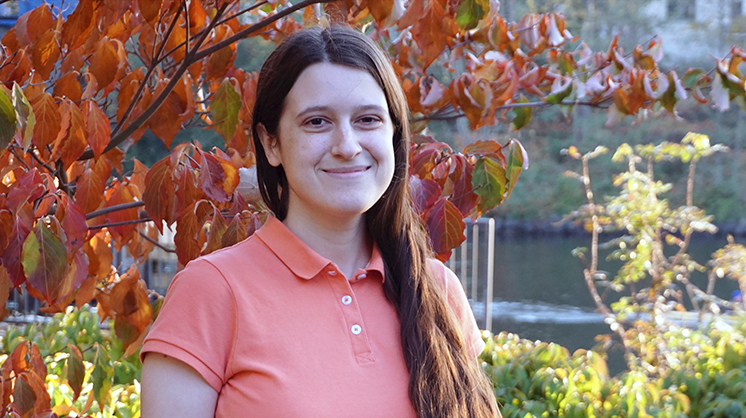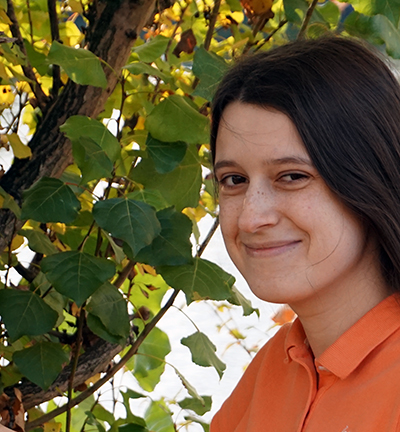Emma Breen’s successful career as a software engineer at Google continues to surprise her. She struggled with homework assignments throughout her first three years as a computer science student at Rice University.
“I loved to write and was terrible with computers,” said the CS alumna. “But talking to my brother about a computer science class at our high school made me want to try it, even if I wasn’t good at it. My teacher was fantastic and I realized that I had a talent for programming after all.”
She looked for colleges where she could double-major in English and CS. Breen said, “Since I was from Houston and both my parents and brother went to Rice, I was looking elsewhere. Then I got to visit my brother in Wiess College and saw how great the outdoor hallways were. I knew if I got into Rice, I could ask to be assigned to his college, so I applied early decision.”
At Rice, Breen’s passion for writing was trumped by her deadlines for computer science projects and her work in both majors suffered from her tendency to procrastinate. “Nothing I tried or read about online seemed to work for me,” said Breen. “I’d tell anyone struggling with procrastination that they’ll have to find their own ways to work through it.”
Breen’s tendency to procrastinate only seemed to affect her homework. She won a prestigious international internship as a freshman and spent the summer in Japan, immersed in research and thriving in Japanese language and culture. “I had so much fun that summer in Japan, I began to put more stock in research and dreamed of working in artificial intelligence (AI) or language processing.”
After joining Devika Subramanian’s team for several small machine learning (ML) research projects, Breen took a parallel computing class and applied for a summer research role in a different group. Breen said, “I wish I could say that went well, but my supervisor was in California that summer and I ended up sitting alone at my desk a lot. I didn’t accomplish much.”
In her junior year, Breen said her procrastination finally caught up with her. As the projects got harder and more complex, she spiraled through cycles of stress and panic. She felt ashamed of turning in projects late and began avoiding her professors. In fact, she went to the spring Career Expo to look for a software internship because unlike research work, industry applications did not require a faculty recommendation.
“I met the recruiters from FactSet,” she said, “and they told me they had a nice internship in Connecticut and that seemed pretty far away from Rice and the troubles I was having there, so I told them I was interested. I passed the telephone interview, and then I had an onsite interview and at the end of the onsite interview, they offered me an internship.”
Then Breen’s procrastination and late or incomplete coursework led to what she called a minor breakdown at Rice. “I wasn’t sure if it would be a good idea to even come back for my senior year. But I already had the internship lined up, so I went to Connecticut.”
“When I came back to Rice after the internship, I had worked out that my procrastination problems were the worst when I isolated myself, so I signed up for courses that involved collaborative project assignments. A little bit at a time, my work began to shine.”
Breen’s work in her internships was already shining and FactSet made her a return offer.
“Funny story,” she said, “before coming to FactSet, I assumed I was bad at software engineering, that I was quiet and couldn’t work well with others. But I was wrong. I discovered I liked working and talking with people and presenting my ideas. I was active in meetings–I impressed everyone and impressed myself.”
 That September, Breen still had six weeks to respond to her FactSet offer when Google came to recruit at Rice. Based on the specs of the typical applicant, Breen didn’t think she had a chance with Google.
That September, Breen still had six weeks to respond to her FactSet offer when Google came to recruit at Rice. Based on the specs of the typical applicant, Breen didn’t think she had a chance with Google.
Her roommate urged Breen to apply, citing her strength at explaining technical topics to other people. Breen still didn’t go by the Google booth, but her roommate’s sister–one of the Google recruiters–stopped by for a quick family visit later that night.
“She ended up hanging out in our room and I got a chance to ask her some questions about working at Google. But I didn’t mention to the recruiter that I was interested–I just applied online. Then I passed all my interviews and accepted Google’s offer.”
In the two years Breen has worked at Google, she’s experienced one success after another. “I’ve won prizes at hackathons and I’ve been promoted. Outside of work, I’ve been able to hang out more with friends and work on personal projects, in both writing and coding. It turns out not having homework is great for my psyche!”
Her confidence led her to tackle two big projects during internal hackathons. “The first time, I took on a feature other people said looked too hard for a hackathon. It ended up winning the ‘most demo-able prize’ and when it went into production, it improved our sales for a particular product by 50%.
“My second hackathon project was great because it helped our team deal with its on-call rotation. That’s when you take a cell phone to your bed and get paged at three in the morning to handle a crisis. I thought we should try to fix the underlying problem behind a third of those midnight calls. My hackathon partner and I created a method to solve those particular issues automatically instead of manually, and the team loved it.”
Breen advises current and prospective CS students to trust themselves. She said when faced with the challenges that come along with the CS program’s rigor, students will do best if they just relax and find the best environment for their unique strengths and inclinations. In her case, pulling her weight in meetings and team projects trumped her tendency to procrastinate.
“There isn’t only one right way to be a CS student. You’re going to have to work with the personality you have, not the one you, or anyone else, wishes you would have.”
She also encourages students to think about their strengths outside of their academic performance. Breen’s career success is proof that achievement in the technology industry is not directly tied to college grades, and despite everything, she always enjoyed the aspect of solving problems by programming solutions.
“A good day at work is a day when I get lots of coding done. I do enjoy team meetings, planning out big projects, making presentations, and joining my team for monthly board game nights. But the best days are still when I can code. I love to code–it’s the reason I got into CS in the first place.”
Emma Breen earned her B.S. in Computer Science in 2015.
